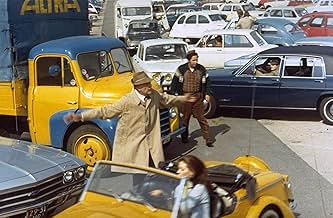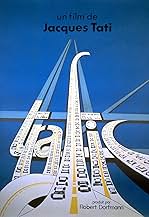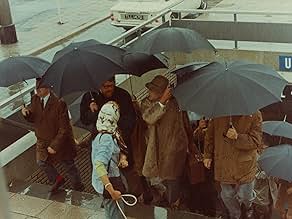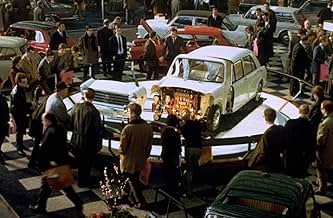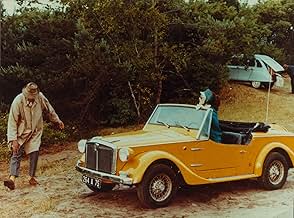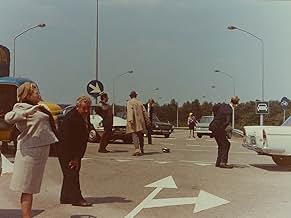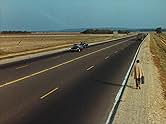Trafic
- 1971
- Tous publics
- 1h 36m
IMDb RATING
7.0/10
8.1K
YOUR RATING
Mr. Hulot drives a recreational vehicle from Paris to Amsterdam in his usual comical, disastrous style.Mr. Hulot drives a recreational vehicle from Paris to Amsterdam in his usual comical, disastrous style.Mr. Hulot drives a recreational vehicle from Paris to Amsterdam in his usual comical, disastrous style.
- Director
- Writers
- Stars
- Nominated for 1 BAFTA Award
- 1 win & 1 nomination total
Jacques Tati
- Monsieur Hulot
- (as Mr. Hulot)
Honoré Bostel
- Director of ALTRA
- (as Honore Bostel)
François Maisongrosse
- François
- (as F. Maisongrosse)
Marco Zuanelli
- Mechanic
- (as Mario Zanuelli)
- Director
- Writers
- All cast & crew
- Production, box office & more at IMDbPro
Featured reviews
This really is not unpleasant, and I smiled a good deal (when I wasnt bored); but an hour in I knew I wouldn't watch this again after this viewing most likely, which is not the case with Tati's other Hulot films that are pretty masterful on the whole (think like, say, going from A Night at the Opera to Room Service with the Marx brothers and you may catch my drift).
Tati is so into having little bits of business that the movie often forgets to have... gags. Or, that is not always fair, perhaps it thinks the little bits of behavior are enough to sustain it, but without things like relatable characters it feels aloof. And while the whole overall irony is that they actually don't get to the auto show in Amsterdam due to the mishaps and ballyhoo, I suspect there would have been some rich chances for more satisfying plants and payoffs, or quick visuals (Hulot in the half-car is a hoot), than what we get with the misadventures and long stays at the office (to show how the camping car works) and at the farmhouse.
The multi-car nose picking (but not one booger eaten, come on, France), the multi-car melee (especially that one car's hood flapping away) and Hulot getting stuck up in the tree upside down trying his damndest to fix the outside hedge fixture on the house are the highlights and are funny. And there are little bits of grace notes that made me laugh a bit, like when Hulot steps into the guys office, turns around and knocks, the man at the desk says to come in, then he leaves and talks to the man at the other desk he just passed (!) Or the moment where that one barking dog in the countryside house is just a big softee.
Dare I say, as admirable as the effort is, Tati (on a post Playtime high) is a little too satisfied with his own flights of fancy. I think the problem too is not that a filmmaker is engaged more with behavior than story or plot - what would cinema be without Altman or Cassavetes if that was the case - but the larger context and people in it need to matter for that behavior to take shape, and this features... a slightly bumbling but not more or less than usual Hulot, and that one American woman (director of ALTRA, she doesn't even have a name), who seems stuffy and not that sympathetic for much of the time. I know, I know: tragedy in close up and comedy in long shot and so on, but there are limits.
Ok, one more nice part: The images of the cars driving fast and the chaos of the last ten minutes set to Charles Dumont's burst of rock and roll.
Tati is so into having little bits of business that the movie often forgets to have... gags. Or, that is not always fair, perhaps it thinks the little bits of behavior are enough to sustain it, but without things like relatable characters it feels aloof. And while the whole overall irony is that they actually don't get to the auto show in Amsterdam due to the mishaps and ballyhoo, I suspect there would have been some rich chances for more satisfying plants and payoffs, or quick visuals (Hulot in the half-car is a hoot), than what we get with the misadventures and long stays at the office (to show how the camping car works) and at the farmhouse.
The multi-car nose picking (but not one booger eaten, come on, France), the multi-car melee (especially that one car's hood flapping away) and Hulot getting stuck up in the tree upside down trying his damndest to fix the outside hedge fixture on the house are the highlights and are funny. And there are little bits of grace notes that made me laugh a bit, like when Hulot steps into the guys office, turns around and knocks, the man at the desk says to come in, then he leaves and talks to the man at the other desk he just passed (!) Or the moment where that one barking dog in the countryside house is just a big softee.
Dare I say, as admirable as the effort is, Tati (on a post Playtime high) is a little too satisfied with his own flights of fancy. I think the problem too is not that a filmmaker is engaged more with behavior than story or plot - what would cinema be without Altman or Cassavetes if that was the case - but the larger context and people in it need to matter for that behavior to take shape, and this features... a slightly bumbling but not more or less than usual Hulot, and that one American woman (director of ALTRA, she doesn't even have a name), who seems stuffy and not that sympathetic for much of the time. I know, I know: tragedy in close up and comedy in long shot and so on, but there are limits.
Ok, one more nice part: The images of the cars driving fast and the chaos of the last ten minutes set to Charles Dumont's burst of rock and roll.
Tati's final theatrical film, which is often considered his greatest failure, is in actuality nearly as good as his masterpieces. In this film, Tati stars for the fourth and final time as M. Hulot. This time he has a job as an automobile designer, and it is his job to get his company's new Camping Car to Amsterdam for a big auto show. Accompanying him is a driver, François, and a public relations worker, Maria (played marvelously by Maria Kimberly, who reminds us of the great lead actress roles played by Nathalie Pascaud and Barbara Denneck in M. Hulot's Holiday and Playtime respectively). Maria drives around in a little yellow convertible with her little fur-ball dog. Its fast and maneuverable. It can go pretty much anywhere it wants. Unfortunately, François and M. Hulot are driving a large truck. They often get into trouble when they're trying to follow Maria's car. Every problem that can happen does. Many observations are made about how people act when they're in their cars on the highway (it's a non-stop traffic jam from Paris to Amsterdam). The jokes in Traffic are always hilarious. The first fifteen or twenty minutes are somewhat dry of them, which is mainly why I don't rank this one up there with M. Hulot's Holiday, Mon Oncle, and Playtime (it's about even with Jour de fête). But when it gets going, it never stops. And it's beautiful, too, just as all of his other films. The final sequence is sublime, and the final shot will stay with me forever. 9/10.
Whilst not Tati's best by any stretch of the imagination the genius of the man still shines through. Having lived in France for a while I see more humour in this film, particularly in the comedic observation, than before. The French may be fanatical about cinema and may well have produced some of the world's greatest film makers but out and out comedy probably ranks well down in terms of output. Maybe it's something to do with the French sense of humour (whatever that may be). Unlike British, and to a lesser extent US comedy, self-parody is not a French strength. It could be something to do with their history and education but the culture, so strong in literature and the arts seems not to demean itself with pure laughter. Most cinema fans would probably be hard put to list 10 French comedies - other than perhaps drama with the occasional comic undertones. Les Visiteurs (the original not the recent re-make) is probably one of the better examples but here again there's little or no self-mocking.
So it was left to Tati to mine the seam - and how well he mined it. Here he takes the smallest of French (dare I say Parisian) mannerisms and extends them into lengthy scenes of beautifully observed comedy. Whether it's the windscreen wipers in tune with the occupants or the nose-picking drivers, he asks the French to at least smile, if not laugh out loud, at themselves.
Yes, the film does move at rather a slow pace and there are times when the comic observation sags, but the sight of dear old M Hulot in his mackintosh, loping along with pipe jutting from his mouth will ever remain one of cinema's delights.
So it was left to Tati to mine the seam - and how well he mined it. Here he takes the smallest of French (dare I say Parisian) mannerisms and extends them into lengthy scenes of beautifully observed comedy. Whether it's the windscreen wipers in tune with the occupants or the nose-picking drivers, he asks the French to at least smile, if not laugh out loud, at themselves.
Yes, the film does move at rather a slow pace and there are times when the comic observation sags, but the sight of dear old M Hulot in his mackintosh, loping along with pipe jutting from his mouth will ever remain one of cinema's delights.
Despite bearing the opening declaration 'M. Hulot dans', everybody's favourite Frenchman again has a tendency to wander in and out of action rather perfunctorily executed; although he manages to be much more in evidence than his earlier 'PlayTime'
It was only a matter of time before Jacques Tati tackled humanity's eternal nemesis - the motor car - in a film that gives a new meaning to the term 'road movie'.
First we see them assembled on a production line before being unleashed upon a hapless public - all to the accompaniment of a deceptively jaunty score.
A couple of the sight gags are genuinely funny, but one tends to view the proceedings with interest rather than involvement.
It was only a matter of time before Jacques Tati tackled humanity's eternal nemesis - the motor car - in a film that gives a new meaning to the term 'road movie'.
First we see them assembled on a production line before being unleashed upon a hapless public - all to the accompaniment of a deceptively jaunty score.
A couple of the sight gags are genuinely funny, but one tends to view the proceedings with interest rather than involvement.
I didn't know what to expect when I went to see this movie many years ago. I was delightfully surprised. This is a very funny movie, but it is subtle in it's kookie-ness.
Two men have developed a new camping van and have set out to take it to an outdoors show. This should be an ordinary trip full of coffee, donuts and long boring stretches of road. But no, this does not take place in America; it starts in Paris and the goal is Amsterdam. Much can happen along such a route, and in this case, just about everything does.
Will they make it there before the show has ended? Will their dreams of being successful come to pass? These are the driving questions of this movie. They seem rather uninteresting goals, don't they? Nevertheless, these characters will likely win you over and have you rooting for them as they make their bumbling stab at entrepreneurship. Or, just as likely, you may find yourself enjoying every obstacle that steps in their way, as I did.
Much is unexpected in this movie and that's what makes it fun! Share this one with your friends and they will thank you.
Note: this is a comedy, there's not much gore or street fights, shoot-outs or bombs taking out city blocks, so be forewarned, this movie with not shake your subwoofer.
Although not a spy movie, it somewhat reminds me of the original "Tall Blonde Man with One Black Shoe": another wonderful French comedy.
Two men have developed a new camping van and have set out to take it to an outdoors show. This should be an ordinary trip full of coffee, donuts and long boring stretches of road. But no, this does not take place in America; it starts in Paris and the goal is Amsterdam. Much can happen along such a route, and in this case, just about everything does.
Will they make it there before the show has ended? Will their dreams of being successful come to pass? These are the driving questions of this movie. They seem rather uninteresting goals, don't they? Nevertheless, these characters will likely win you over and have you rooting for them as they make their bumbling stab at entrepreneurship. Or, just as likely, you may find yourself enjoying every obstacle that steps in their way, as I did.
Much is unexpected in this movie and that's what makes it fun! Share this one with your friends and they will thank you.
Note: this is a comedy, there's not much gore or street fights, shoot-outs or bombs taking out city blocks, so be forewarned, this movie with not shake your subwoofer.
Although not a spy movie, it somewhat reminds me of the original "Tall Blonde Man with One Black Shoe": another wonderful French comedy.
Did you know
- TriviaThe end scene (people walking with umbrellas between parked cars) was shot on the parking lot of the then still functioning Amsterdam Ford factory.
- GoofsSeveral (Dutch) license plates can be seen on various different vehicles, sometimes even in the same shot. For instance the license plate "FT-92-65" can be seen in the petrol station scene on both a Peugeot 504 and a Chrysler 180. Later the same plate is on a Peugeot 204 passing in front of the exhibition center. In the "road rage" scene the number 76-04-NF is on both the Renault 16 and the Citroën ID. Shortly after the same plate is on an Opel Kadett parked in front of the exhibition center.
- Quotes
Radio Announcer: The Cyclone 70. A new raincoat... especially made for the sun.
- Crazy creditsIn the opening credits, Tati is billed simply as "M. Hulot." He does, of course, use his real name for his writing and directing credits.
- ConnectionsFeatured in Omnibus: Monsieur Hulot's Work (1976)
- How long is Traffic?Powered by Alexa
Details
- Release date
- Countries of origin
- Official site
- Languages
- Also known as
- Traffic
- Filming locations
- Production companies
- See more company credits at IMDbPro
Box office
- Gross worldwide
- $51,348
- Runtime
- 1h 36m(96 min)
- Sound mix
- Aspect ratio
- 1.37 : 1
Contribute to this page
Suggest an edit or add missing content

